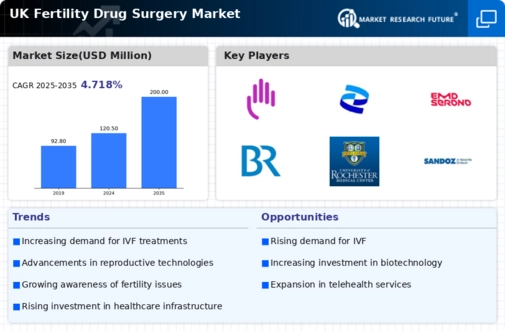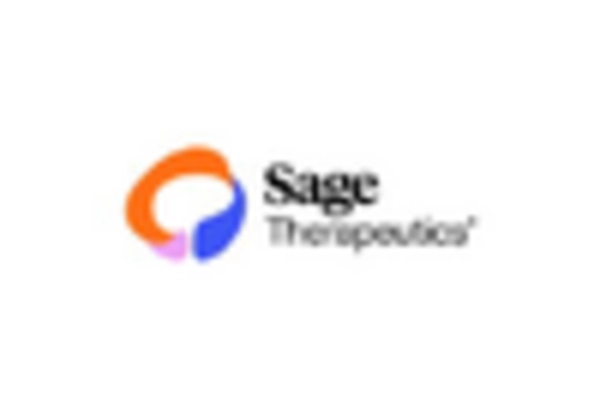Increasing Infertility Rates
The rising rates of infertility in the UK are a primary driver for the fertility drug-surgery market. Recent statistics indicate that approximately 1 in 7 couples experience difficulties conceiving, which translates to around 3.5 million individuals affected. This growing prevalence of infertility has led to an increased demand for fertility treatments, including both drug therapies and surgical interventions. As more individuals seek assistance, healthcare providers are expanding their offerings, thereby stimulating market growth. The fertility drug-surgery market is expected to see a compound annual growth rate (CAGR) of around 8% over the next few years, reflecting the urgent need for effective solutions to address infertility challenges in the UK.
Rising Awareness and Education
There is a growing awareness and education surrounding fertility issues in the UK, which is driving the fertility drug-surgery market. Campaigns aimed at educating the public about infertility and available treatment options have led to increased consultations with fertility specialists. This heightened awareness is particularly evident among younger demographics, who are more informed about reproductive health. As individuals become more proactive in seeking treatment, the demand for fertility drugs and surgical procedures is likely to rise. The fertility drug-surgery market may experience a notable increase in patient inquiries and treatment uptake, potentially leading to a market growth rate of 6-8% in the coming years.
Advancements in Medical Technology
Innovations in medical technology are significantly influencing the fertility drug-surgery market. The introduction of minimally invasive surgical techniques, such as laparoscopy, has improved patient outcomes and reduced recovery times. Additionally, advancements in drug formulations and delivery methods have enhanced the efficacy of fertility medications. For instance, the development of new hormonal therapies has shown promise increasing success rates for assisted reproductive technologies. The market is projected to grow as these technological advancements continue to evolve, potentially increasing the overall success rates of fertility treatments. The integration of artificial intelligence in treatment planning may further optimize patient care, making the fertility drug-surgery market more attractive to both patients and healthcare providers.
Government Initiatives and Funding
Government initiatives and funding for fertility treatments are playing a crucial role in shaping the fertility drug-surgery market. The UK government has implemented policies to support couples facing infertility, including funding for in vitro fertilization (IVF) treatments through the National Health Service (NHS). Such initiatives not only alleviate the financial burden on patients but also encourage more individuals to pursue fertility treatments. As a result, the fertility drug-surgery market is likely to benefit from increased patient access to necessary services. The ongoing commitment to funding fertility treatments may lead to a sustained growth trajectory for the market, with projections indicating a potential increase in market size by 10% over the next few years.
Cultural Shifts and Changing Family Dynamics
Cultural shifts and changing family dynamics in the UK are influencing the fertility drug-surgery market. As societal norms evolve, more individuals are choosing to delay parenthood for various reasons, including career aspirations and personal choices. This trend has resulted in a higher demand for fertility treatments as older individuals may face increased challenges in conceiving. The fertility drug-surgery market is adapting to these changes by offering tailored solutions that cater to the needs of this demographic. The market may see a significant uptick in demand for fertility drugs and surgical interventions, potentially leading to a growth rate of 7-9% as more individuals seek assistance in achieving their family planning goals.
















